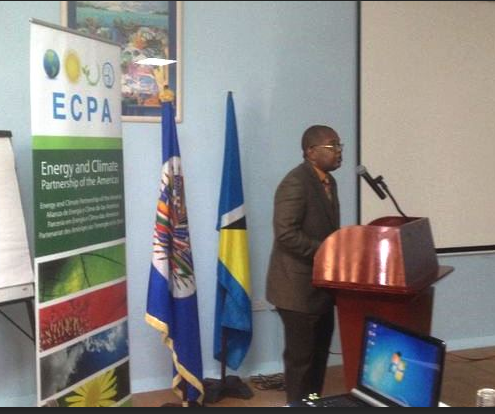
 In his remarks at the event, Saint Lucia’s Minister for the Public Service, Sustainable Development, Energy, Science and Technology, James Fletcher, stressed the importance of sustaining efforts to transform the region’s energy sector. He noted that the high cost of electricity undermines business productivity in Caribbean countries, a factor that must be addressed if the region is to stand a chance of enhancing sustainable development.
In his remarks at the event, Saint Lucia’s Minister for the Public Service, Sustainable Development, Energy, Science and Technology, James Fletcher, stressed the importance of sustaining efforts to transform the region’s energy sector. He noted that the high cost of electricity undermines business productivity in Caribbean countries, a factor that must be addressed if the region is to stand a chance of enhancing sustainable development.
The Caribbean region imports the vast majority of the energy resources it uses. It generates most of its electricity from diesel or gasoil and has only modest hydro resources. The development and use of natural resources—including renewable energy sources to generate electricity—will be essential to facilitate a transition to a more secure and sustainable energy future. While renewable energy is a key component of that transformation, the startup costs of some technologies can be a barrier.
It was against this backdrop that the OAS Department of Sustainable Development, the executing agency for the ECPA Sustainable Energy Capacity Building Initiative, organized this event. In his opening remarks, Cletus I. Springer, Director of the OAS Department of Sustainable Development, applauded what he called “the renaissance” taking place in the energy sector in the Caribbean. He noted that while the region was making strides toward sustainable energy solutions, countries need to work together and learn from each other within a coordinated strategic framework, so as “not to reinvent the wheel.”
Among those in attendance were senior government officials in charge of their countries’ energy portfolio, as well as representatives of donor agencies and technical experts. Participants included representatives of the Caribbean Development Bank, the European Union, the U.S. Department of State, U.S. Department of Energy, and Carbon War Room, a nongovernmental organization that promotes business solutions to reduce carbon emissions. The aim of the workshop was to identify solutions that have proved to be effective and to establish short- and medium-term priorities.

This was the second workshop held by the ECPA Sustainable Energy Capacity Building Initiative in the Caribbean, which seeks to address challenges involved in commercializing and expanding the development and use of sustainable energy technologies for power generation. Through this initiative, the OAS is facilitating a transition toward a diversified energy market that favors low-carbon technologies and reduces dependence on imported fossil fuels, whose high and fluctuating prices have a negative impact on the trade balance of small island states.
 View Map
View Map